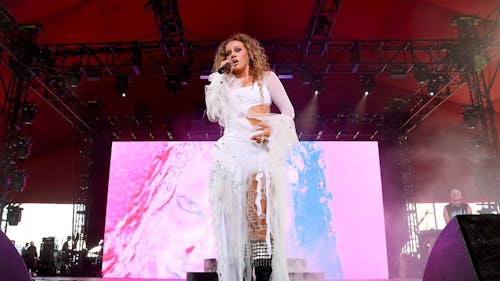ABD-ELHAMEED: Elyanna's performance at Coachella proves Arabic artistry should be celebrated
Column: Something to Think About

Coachella Valley Music and Arts Festival is one of the most popular music festivals in the world. The festival is hosted each April in Indio, California, and serves as a platform for the world's most influential artists. It is known for its high attendance in celebrity appearances and bohemian-chic-inspired — and sometimes quite outlandish — outfits.
What the music festival is not known for is hosting artists who sing in Arabic.
Palestinian-Chilean singer-songwriter Elyanna became the first artist to sing a full set in Arabic in Coachella history. She spent both festival weekends singing songs from her EP and album and covering famous Arabic songs, as well as remixing both English and Arabic together.
From Nazareth, Palestine, it is noticeable that the singer-songwriter is proud of her Arab roots as she wore black eyeliner — known as "kohl" in Arabic and originating from ancient Egypt — and Arab-inspired outfits with her use of gold jewelry and coin accents.
Her band members even used traditional Arabic instruments during her performances, such as the Tabla, Oud and Derbake.
The singer signed with El Mar Music in 2020 but signed with Universal Arabic Music this year, the record label founded by The Weeknd's current manager.
If I am being honest, I only discovered Elyanna due to her Coachella debut. I remember scrolling on TikTok while Coachella was going on, and a video of her singing on stage popped up on my feed.
It took me a second to register that she was singing in Arabic and that she was performing at one of the most iconic music festivals.
After that one video, TikTok's algorithm kept bringing me back to more videos of her Coachella performances that were recorded and uploaded by people in the crowd. Every comment I have read from videos of her performances on TikTok and YouTube radiated nothing but pride and support toward Elyanna.
I also came across videos of young women who shared Arab, Middle Eastern and Palestinian roots who expressed their shock and pride toward Elyanna at the music festival — the same shock and pride that I had felt.
This kind of pride and unity that I felt and what was circulating among other Arabs and Middle Easterners resembled the familiar feeling when Morocco was the last standing African nation in the 2022 FIFA World Cup.
Morocco not only represented the entire African continent during the FIFA World Cup but also represented and united the Arab, Middle Eastern and Muslim-majority nations. These communities were unified in a way that had almost never happened before and was desperately needed.
Elyanna at Coachella was historic in the same way Morocco had been during the FIFA World Cup. Of course, there are a number of highly successful artists and producers from the Middle East-North Africa region, such as Lebanese-Canadian talent manager Wassim "Sal" Slaiby, Moroccan-American rapper French Montana and Palestinian producer DJ Khaled.
The difference is that you do not hear Montana singing in Arabic besides dropping the occasional "bismillah" or "alhamdulillah," along with hip-hop artists like Drake and A$AP Ferg.
Not only did Elyanna's performance uplift and unite the Arab community, but Westerners and non-Arabs were also introduced to a different sound, culture and history.
This year's Coachella was also significant for the Latino and Korean communities, with Bad Bunny and Blackpink being the first Latino solo artist and first K-Pop group to headline the festival, respectively. Along with third headliner Frank Ocean, this is the first time the festival was headlined by non-White artists.
These kinds of moments, not just in music history, foster a more inclusive and supportive community among people from varying ethnicities and backgrounds while educating non-community members in the process.
It is extremely important that we recognize and celebrate Arabic artistry for these reasons, but also because it empowers younger generations of Arab roots to share their culture and take pride in their identity. It gives hope to Palestinians in Palestine, many of whom live in constant fear and suffer persecution.
I hope this monumental moment will pave the way for more Arab representation in the music industry and that this will not be the last time an artist introduces Arabic music to the Coachella stage.
Arabic artistry deserves to be celebrated.
Naaima Abd-Elhameed is a senior in the School of Arts and Sciences majoring in journalism and media studies and minoring in Arabic and international and global studies. Her column, "Something to Think About," runs on alternate Mondays.
*Columns, cartoons and letters do not necessarily reflect the views of the Targum Publishing Company or its staff.
YOUR VOICE | The Daily Targum welcomes submissions from all readers. Due to space limitations in our print newspaper, letters to the editor must not exceed 900 words. Guest columns and commentaries must be between 700 and 900 words. All authors must include their name, phone number, class year and college affiliation or department to be considered for publication. Please submit via email to oped@dailytargum.com by 4 p.m. to be considered for the following day's publication. Columns, cartoons and letters do not necessarily reflect the views of the Targum Publishing Company or its staff.



